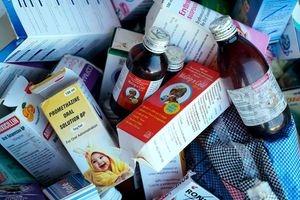Cough syrups taken off UK shelves are being sold in Kenya

A child taking syrup.
What you need to know:
- A spot check in online pharmacies showed three medicines used to treat coughs and cold: Day & Night Nurse Capsules, Day Nurse Capsules and Day Nurse are sold in local pharmacies.
- Their prices range between Sh1,600 and Sh2,000, and a further analysis reveals that they contain an ingredient causing a stir in the UK.
Some of the cough syrups withdrawn from the United Kingdom’s pharmacy shelves are available in the Kenyan market, but the drugs are not registered by the Pharmacy and Poisons Board (PPB), the Healthy Nation has learnt.
A spot check in online pharmacies showed three medicines used to treat coughs and cold: Day & Night Nurse Capsules, Day Nurse Capsules and Day Nurse are sold in local pharmacies.
Their prices range between Sh1,600 and Sh2,000, and a further analysis reveals that they contain an ingredient causing a stir in the UK.
Despite the drugs being available in Kenya, an online search of the drugs via the Pharmacy and Poisons Board website shows that they are not registered in the country. This raises questions on how they got to the shelves.
In the UK, about 20 different cough syrups have been withdrawn from the shelves, with their government calling it a ‘precautionary measure’.
The said drugs were found to trigger rare events of allergic reactions that could escalate to be a fatal case. All the drugs taken away from the shelves contain an ingredient called pholcodine.
“Pholcodine-containing cough and cold medicines are being withdrawn from the UK market as a precaution following a review, which found that their benefits do not outweigh the increased risk of the very rare event of anaphylaxis to neuromuscular blocking agents used in general anaesthesia,” said a statement from the UK’s Medicines and Healthcare Products Regulatory Agency.
“These medicines are typically sold behind the counter and will no longer be available for purchase.”
Experts have pointed to a very small chance of people experiencing an allergic reaction when pholcodine is combined with general anaesthetic. As a result, the UK’s drugs regulator has taken this proactive measure to ensure patient safety.
Reaction from specialists published by the Science Media Centre shows that the scientists had warned of the reactions even before the government made the decision. “Our National Audit Project has previously highlighted the possible link between pholcodine and severe allergic reactions (anaphylaxis) to some drugs used in anaesthesia,” said Dr Fiona Donald, President of the Royal College of Anaesthetists.
However, the government’s drug regulator based its decision following guidance from the Commission on Human Medicines, the advisory body that provides expert advice on drug safety.
All the specialists insist that despite the risk being small, the withdrawal from the shelves is welcome as safety of patients trumps any risks taken.
“It should be emphasised that this risk is very small – less than 1/10,000 people given a muscle relaxant during a general anesthetic would experience the reaction – but it can be life threatening if it occurs. Pholcodine containing medicines are otherwise well tolerated by the many thousands of adults and children that have taken them,” said Prof Penny Ward, a pharmaceutical medicine professor at King’s College London.
For patients worrying what alternatives there could be, president of the Royal Pharmaceutical Society, Prof Claire Anderson, advises that cough usually clears in three to four weeks
“You can treat it with other cough medicines or hot lemon and honey (not suitable for babies under one year old). Rest up if possible and you can try paracetamol or ibuprofen, if suitable, to treat any pain. If your cough persists for longer than three to four weeks seek advice from a healthcare professional,” she said.
In December last year, Europe's medicines regulator, the European Medicines Agency, recommended the withdrawal of pholcodine medicines from the European market.
“Healthcare professionals should consider appropriate treatment alternatives and advise patients to stop taking pholcodine-containing medicines,” said the EU.
Efforts to get a comment from the Pharmacy and Poisons Board were futile.






